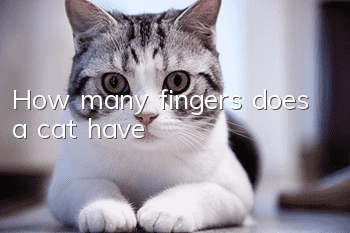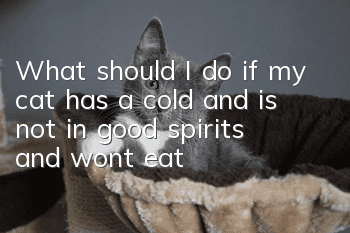Symptoms and causes of food allergies in pet cats

Allergies are not a pleasant thing to suffer, and allergies are also dangerous. Many cats will have symptoms such as skin itching and erythema due to food allergies. In severe cases, cats may have difficulty breathing or even die. Therefore, we cannot ignore the problem of allergies. Food allergy is one of the common allergic factors. Of course, in many cases it is related to the cat’s constitution, and not all cats will have this condition.
1. What is food allergy
The so-called food allergy refers to the body's abnormal allergic reaction to certain substances in food. The body's immune system produces histamine, which leads to the occurrence of allergic reactions.
2. Symptoms of food allergy
Cat food allergies refer to a series of allergies that occur after cats eat certain foods. They are more common in young cats and can be divided into three types: gastric type, skin type and mixed type. In the gastric type, vomiting and diarrhea immediately after ingestion can be seen, and the stool is watery and sometimes bloody; in the skin type, dry skin, rough coat, papules appear on the skin, and local skin damage is caused by itching and rubbing of the eyes, nose, and face. Bleeding; digestive and skin symptoms, weight loss, and dehydration seen in mixed type.
3. Causes of allergies
Food intolerance: There is also a situation where the body will have an allergic reaction when the immune system cannot function. For example, a typical example is that cats often develop lactose intolerance when drinking milk. This is because the body cannot digest the ingested lactose, and undigested lactose in the intestines can cause diarrhea.
Protein causes allergies
In principle, cats eating any food at any time may cause allergic reactions, which is caused by the protein in the food. Beef, mutton, eggs, milk, and seafood can all easily cause allergies in cats. Some people may be surprised, aren’t these the foods that cats usually eat? But the fact is that the high molecular protein contained in meat is more likely to cause allergies to cats.
Allergy has nothing to do with intake time and amount
Cat food allergy has nothing to do with the amount of food ingested. Sometimes, even if you ingest a relatively small amount of food, you will still have allergy symptoms. Some allergic reactions may occur days after ingesting food, making it difficult to determine whether your cat has a food allergy and which food is causing it. At this time, replacing the usual food with hypoallergenic prescription food is the most effective way to restore the cat's immune system and body to normal.
4. Treatment of Cat Food Allergy
First, stop feeding the food that causes allergies immediately (if you know what food it is fromif caused), then take oral diphenhydramine or chlorpheniramine or oral or intramuscular dexamethasone. The owner should always observe the cat's feeding and post-feeding conditions at any time. If the cat is found to be allergic to a certain food, he should stop feeding that food in time and switch to other foods.
Food allergy is actually a relatively dangerous thing. If the situation is not very serious, then there may only be some superficial symptoms and no real harm will occur. However, if the cat is severely allergic to a certain food, Then it is very likely to directly lead to the death of the cat. Therefore, owners must pay more attention to the cat's diet. As long as the cat has discomfort due to this kind of food, they must find out whether it is caused by food deterioration or allergies.
- What should I do if my cat doesn’t like to drink water? There are tricks to make cats drink water!
- What are the common types of cat litter?
- What are the blood types of cats?
- What happens if a cat vomits after eating cat food?
- Preventive knowledge on three common skin diseases in cats!
- Is it too late to take hair removal cream for cats with hairball disease?
- The cat suddenly became anorexic and became skin and bones
- What should I do if my cat’s nail clipping bleeds?
- Will pregnant cats become sleepy?
- How to deal with cat poop on your body



